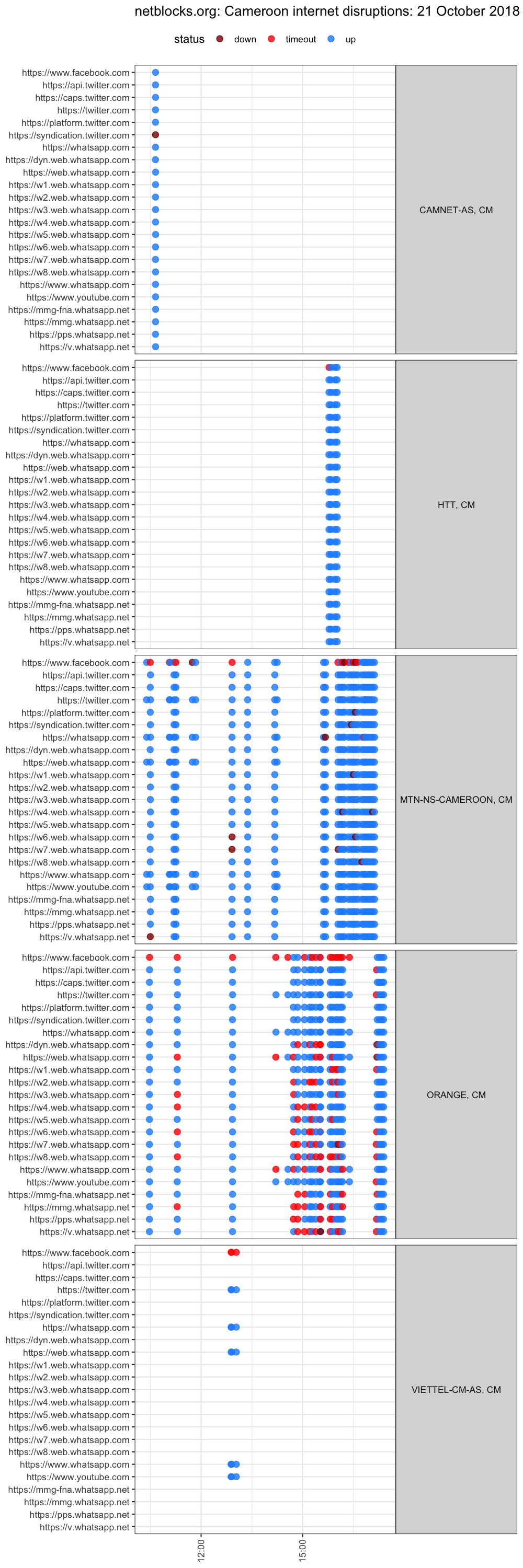Network measurements collected by the NetBlocks internet observatory show that social media and messaging services have been slowed, or throttled, by major ISPs in Cameroon, as citizens await the announcement of results on Monday of a contested presidential election held earlier in October. The restrictions are believed to be implemented to halt planned popular demonstrations against the Constitutional Council and presidential incumbent Paul Biya.
Confirmed: #Facebook and #WhatsApp restricted in #Cameroon on eve of election results #KeepItOnhttps://t.co/9eVkbTl0Pn
— NetBlocks (@netblocks) October 21, 2018
Over 7000 metrics collected over the weekend, consisting of timing, location and network data show that Facebook and WhatsApp have been slowed to the point of being unusable on the Orange network, while Facebook is restricted on the Nexttel (Viettel Cameroon) and MTN networks and other smaller providers.
Median latencies exceeding 10 seconds were evident throughout Sunday, while other websites and services including Twitter and Instagram remained unaffected. The NetBlocks measurements, taken with assistance from rights group Internet Sans Frontières, cover all major mobile and fixed line operators, providing a comprehensive survey of Cameroon’s IP space.
The election results due to be released on Monday morning are predicted to show a resounding victory for Paul Biya, who has put himself forward for a seventh term. Facebook users had organised a march to “say goodbye to Biya” who is in his 36th year as president, and WhatsApp has been used extensively to coordinate street protests, presenting a likely motive for the restrictions.
Cameroon has an extensive history of use of short-term and long-term network disruptions under the pretext of security, although disruptions during the election period present a novel threat to democratic processes and transparency in the country.
#Cameroon restricted access to #Facebook in #Douala since yesterday evening and today morning. Some opposition members and civil society activists have planned a demonstration against the #constitutionalcouncil decision. #Etoudi2018 #Internet
— Hans De Marie (@hansdemarie) October 21, 2018
Cameroon has faced spiralling violence between majority French-speaking and minority English-speaking communities, who allege voter suppression and cultural repression. The process and legal context in which the restrictions are implemented has not been revealed.
International civil society organisation NetBlocks is conducting a scaled-down digital observation of the Cameroon election period using the same methodology proposed for the OSCE region, which combines multiple internet-scale measurement technologies to provide a comprehensive view of the flow of information online.
Methodology
Internet performance and service reachability are determined via NetBlocks web probe privacy-preserving analytics. Each measurement consists of latency round trip time, outage type and autonomous system number aggregated in real-time to assess service availability and latency in a given country. Network providers and locations are enumerated as vantage point pairs. The root cause of a service outage may be additionally corroborated by means of traffic analysis and manual testing as detailed in the report.
NetBlocks is an internet monitor working at the intersection of digital rights, cyber-security and internet governance. Independent and non-partisan, NetBlocks strives to deliver a fair and inclusive digital future for all.
[ press | contact ] Graphics and visualizations are provided for fair use in unaltered form reflecting the meaning and intent in which they were published, with clear credit and source attribution to NetBlocks. Intellectual property rights are protected including but not limited to key findings, facts and figures, trademarks, copyrights, and original reporting, are held by NetBlocks. Citation and source attribution are required at the point of use.
